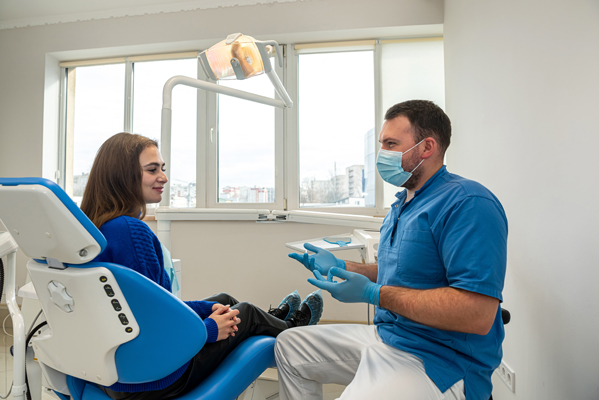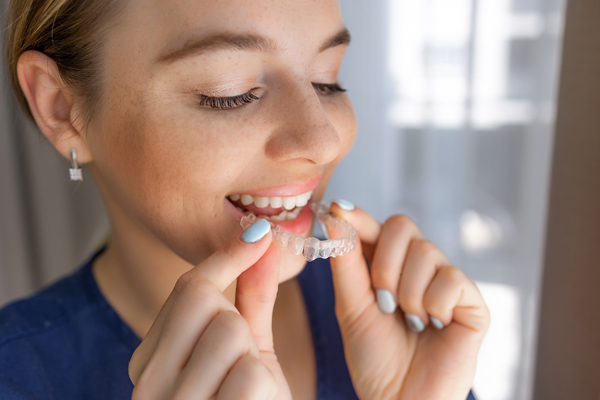General Dentistry Restoration Options to Repair a Damaged Tooth

General dentistry consists of a lot of routine oral health care, which also happens to include restoring teeth that are in bad shape due to damage. Common damage may include cracks, chips, or cavities, all of which can be addressed with the help of different dental restorations. Continue reading to find out what dental restoration options are used in general dentistry and how each one is performed.
Damaged tooth restoration solutions
Outlined below are a few restoration options used in general dentistry to repair teeth that are damaged. Reviewing the following information can be helpful to individuals who need to undergo a restoration.
Dental crowns
The most common dental restoration used in general dentistry is the placement of a dental crown. General dentists recommend dental crowns for just about any type of damage, whether it be cavities, cracks, chips, or severe stains. Because dental crowns completely cap a tooth, they can be used for almost any type of damage.
A dental crown procedure starts with the general dentist removing the damaged parts of the tooth. From there, the tooth is cleaned out to ensure that nothing harmful is left behind. Then, the tooth is capped with a temporary dental crown, made of composite resin. A few weeks later, the patient can return for the placement of the permanent crown.
Fillings, inlays, and onlays
Dental fillings are another general dentistry restoration procedure. They are usually used for teeth that are damaged as a result of cavities. However, general dentists also recommend them for teeth that have minor cracks, as the filling material can seal the crack, thus restoring the tooth.
Inlays and onlays are similar to dental fillings; however, they only address small portions of the teeth. Inlays restore the spaces between cusps, whereas onlays restore the actual cusps of teeth. Both procedures use composite or ceramic materials, making it impossible to detect to the naked eye. This allows for a natural-looking dental restoration.
Dental bonding
Another common dental restoration that is used in general dentistry is dental bonding. This type of treatment is a lot simpler than the others that were mentioned above, but it is still quite effective in restoring damaged teeth.
Dental bonding is performed using a resin material and a curing light. There is no pain involved; however, there may be some light sensitivity afterward. It is most commonly recommended in general dentistry for teeth that are minorly cracked, chipped, or stained.
Find out more from a general dentist
When needing any type of dental restoration to repair teeth that are damaged, the best place to start is by consulting with a general dentist. An evaluation can be done to determine what treatment option is most suitable. From there, the treatment can be administered to restore oral health. To learn more or to get scheduled for an appointment, reach out today. Our general dentistry team can help restore your damaged teeth.
Request an appointment here: https://www.sammamishdentalcenter.com or call Sammamish Dental Center at (425) 340-3113 for an appointment in our Issaquah office.
Check out what others are saying about our dental services on Yelp: General Dentist in Issaquah, WA.
Related Posts
A general dentist often recommends a dental sealant for patients who want to take extra preventative measures to ensure the health and safety of their teeth. A sealant can be utilized if they feel like your molars and other teeth with deep grooves are at risk of suffering damage. If you consider a dental sealant…
Even though good home care is important, general dentistry checkups are still essential for healthy teeth and gums. Time and research have shown that seeing a dentist every six months can help improve your oral health. There are numerous benefits that come from seeing a dentist on a regular basis, while failing to do so…
Professional teeth cleaning in general dentistry is an essential part of maintaining good oral health. However, some patients are curious to know if they can cause damage to their teeth. While it is rare, understanding the possibility can be helpful.Individuals who undergo professional teeth cleanings on a regular basis may be at risk of weakening their…
As Halloween arrives, candy is on everyone's mind. While we at SDC love to indulge in sweet treats during the spooky season, it can be a fright for your teeth! We want to help you enjoy Halloween and all the candy that comes your way while protecting your oral health from too much sugar. Not…


